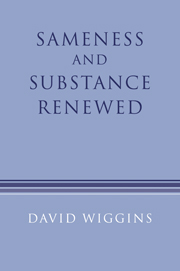Book contents
- Frontmatter
- Contents
- Preface
- Preamble, chiefly concerned with matters methodological and terminological
- 1 The absoluteness of sameness
- 2 Outline of a theory of individuation
- 3 Sortal concepts: and the characteristic activity or function or purpose of things falling under them
- 4 Individuative essentialism
- 5 Conceptualism and realism
- 6 Identity: absolute, determinate, and all or nothing, like no other relation but itself
- 7 Personal identity
- Select bibliography
- Index of names of persons cited or mentioned
- Index of contents (themes, theses, examples, etc)
4 - Individuative essentialism
Published online by Cambridge University Press: 05 June 2012
- Frontmatter
- Contents
- Preface
- Preamble, chiefly concerned with matters methodological and terminological
- 1 The absoluteness of sameness
- 2 Outline of a theory of individuation
- 3 Sortal concepts: and the characteristic activity or function or purpose of things falling under them
- 4 Individuative essentialism
- 5 Conceptualism and realism
- 6 Identity: absolute, determinate, and all or nothing, like no other relation but itself
- 7 Personal identity
- Select bibliography
- Index of names of persons cited or mentioned
- Index of contents (themes, theses, examples, etc)
Summary
Nature loves to hide.
(Heraclitus, Diels fragment 123.)We despise obvious things, but unobvious things often follow from obvious things.
(Leibniz to de Volder, Gerhardt ii, 183.)INDEPENDENCE FROM THE EXPLICITLY MODAL OF THE FOREGOING THEORY OF INDIVIDUATION
Little or no use has been made up to this point of the notion of necessity. We have resisted the idea that a theory of individuation must be a set of judgments about all possible worlds, or occupy itself with problems that are special to the making of statements of explicit necessity de dicto or de re. In the case of the things that belong to natural kinds, we went to some lengths to show that, for all the purposes of identity and individuation that have concerned us so far, it is enough to have regard for the law like propensities of members of the kind. It is enough to look for true generalizations, open and counterfactual-sustaining, about the past, present and future entities of this world. (Enough and more than enough. Our practical understanding of identity and individuation makes do with less.) It is true that, in connexion with artefacts and at the point when the argument for the Only a and b Rule was introduced, something modal appeared to be involved. But in so far as modality obtruded itself there, it was consequential upon the pretheoretical perception of an absurdity that would be marked as such by almost anyone who reflected on the implications of the business of individuation.
Marking the end of modal abstinence, I now follow matters through to the ‘essentialist’ consequences of the theory of individuation expounded in the preceding chapters.
Information
- Type
- Chapter
- Information
- Sameness and Substance Renewed , pp. 107 - 138Publisher: Cambridge University PressPrint publication year: 2001
